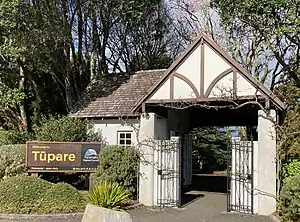Highlands Park, New Plymouth
Highlands Park is a suburb of the New Zealand city of New Plymouth.
Highlands Park | |
|---|---|
 | |
| Coordinates: 39.0831782°S 174.0975057°E | |
| Country | New Zealand |
| City | New Plymouth |
| Local authority | New Plymouth District Council |
| Electoral ward |
|
| Area | |
| • Land | 292 ha (722 acres) |
| Population (June 2022)[2] | |
| • Total | 3,330 |
| Welbourn | Merrilands | Glen Avon |
| Vogeltown |
|
|
| Ridgewood | Burgess Park |
History
In 2011, a local chapter of the Exclusive Brethren proposed building a church in Highlands Park, near most of their 40 members lived nearby. Three nearby residents supported the proposal, but three others opposed it.[3]
As of February 2019, an audit by Taranaki Regional Council found Highlands Park had low levels of recycling contamination, compared to most other New Plymouth suburbs.[4]
In June 2019, a man was arrested on arson charges, after a fire broke out in his Highlands Park home.[5]
In September 2019, a worker at a Highlands Park rest home began taking her newborn black lamb to entertain residents.[6]
Demographics
Highlands Park covers 2.92 km2 (1.13 sq mi)[1] and had an estimated population of 3,330 as of June 2022,[2] with a population density of 1,140 people per km2.
| Year | Pop. | ±% p.a. |
|---|---|---|
| 2006 | 2,490 | — |
| 2013 | 3,009 | +2.74% |
| 2018 | 3,318 | +1.97% |
| Source: [7] | ||
Highlands Park had a population of 3,318 at the 2018 New Zealand census, an increase of 309 people (10.3%) since the 2013 census, and an increase of 828 people (33.3%) since the 2006 census. There were 1,200 households, comprising 1,590 males and 1,725 females, giving a sex ratio of 0.92 males per female. The median age was 49.2 years (compared with 37.4 years nationally), with 597 people (18.0%) aged under 15 years, 381 (11.5%) aged 15 to 29, 1,494 (45.0%) aged 30 to 64, and 852 (25.7%) aged 65 or older.
Ethnicities were 88.4% European/Pākehā, 7.2% Māori, 0.8% Pacific peoples, 7.1% Asian, and 3.5% other ethnicities. People may identify with more than one ethnicity.
The percentage of people born overseas was 21.8, compared with 27.1% nationally.
Although some people chose not to answer the census's question about religious affiliation, 44.8% had no religion, 45.1% were Christian, 0.1% had Māori religious beliefs, 1.1% were Hindu, 1.3% were Muslim, 0.6% were Buddhist and 1.4% had other religions.
Of those at least 15 years old, 639 (23.5%) people had a bachelor's or higher degree, and 510 (18.7%) people had no formal qualifications. The median income was $34,200, compared with $31,800 nationally. 636 people (23.4%) earned over $70,000 compared to 17.2% nationally. The employment status of those at least 15 was that 1,230 (45.2%) people were employed full-time, 393 (14.4%) were part-time, and 72 (2.6%) were unemployed.[7]
References
- "ArcGIS Web Application". statsnz.maps.arcgis.com. Retrieved 11 March 2023.
- "Population estimate tables - NZ.Stat". Statistics New Zealand. Retrieved 25 October 2022.
- Rilkoff, Matt (22 July 2011). "Residents say no to Brethren". stuff.co.nz. Taranaki Daily News.
- Watson, Mike (19 February 2019). "Kerbside audit shows New Plymouth could be losing faith with recycling". stuff.co.nz. Taranaki Daily News.
- McIlraith, Brianna (10 June 2019). "Man taken into custody following suspected arson at New Plymouth home". stuff.co.nz. Taranaki Daily News.
- Persico, Christina (13 September 2019). "Woolimina the lamb has New Plymouth rest home wrapped around her little hoof". stuff.co.nz. Taranaki Daily News.
- "Statistical area 1 dataset for 2018 Census". Statistics New Zealand. March 2020. Highlands Park (New Plymouth District) (218700). 2018 Census place summary: Highlands Park (New Plymouth District)